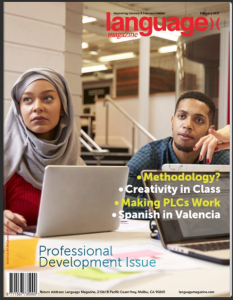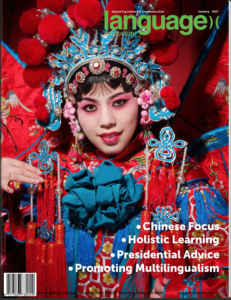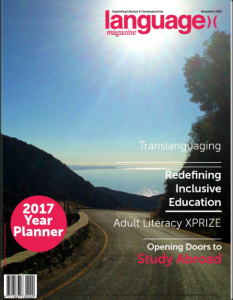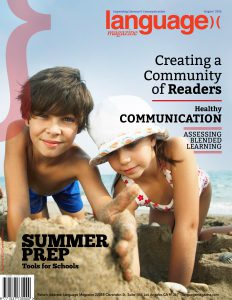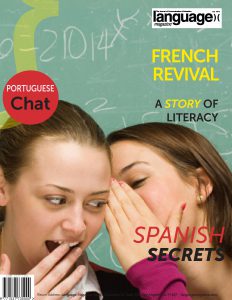 |
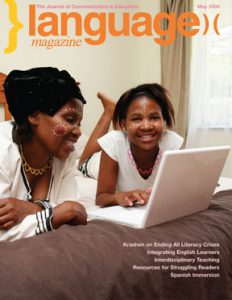 XPRIZE, the global leader in designing and operating world-changing incentive competitions, has announced the eight semifinalist teams are advancing in the $7M Barbara Bush Foundation Adult Literacy XPRIZE featured in the December 2016 edition of Language Magazine. Presented by the Dollar General Literacy Foundation, this is a global competition challenging teams to develop mobile applications for existing smart devices that result in the greatest increase in literacy skills among participating adult learners.
XPRIZE, the global leader in designing and operating world-changing incentive competitions, has announced the eight semifinalist teams are advancing in the $7M Barbara Bush Foundation Adult Literacy XPRIZE featured in the December 2016 edition of Language Magazine. Presented by the Dollar General Literacy Foundation, this is a global competition challenging teams to develop mobile applications for existing smart devices that result in the greatest increase in literacy skills among participating adult learners.
XPRIZE also announced official partnerships with three major U.S. metropolitan areas – Los Angeles, Dallas, and Philadelphia – to support the competition’s next field testing phase. These partnerships encompass a powerful consortium of city mayors, community-based organizations and public education institutions including the Los Angeles Unified School District (LAUSD), City of Philadelphia’s Office of Adult Education (OAE), and the Dallas County Community College District (DCCCD).
“By participating as a partner in the Adult Literacy XPRIZE, L.A. Unified is changing the educational outcomes for our adult learners,” enthused L.A. Unified superintendent Michelle King. “Not only will our students have the opportunity to develop their literacy skills, but our district will gain valuable insight into the supports that best suit the needs of our adult learners. Literacy is essential to preparing our students for post-secondary studies, careers and civic participation in our community.”
Philadelphia Mayor Jim Kenney explained that this was yet another way the city is making quality education accessible for all Philadelphians. “We are smart to invest in education, and partner with innovation, for our adult learners, their families, their neighborhoods and our city. I also want to acknowledge the community of providers, administrators and volunteers that is the backbone of the adult education system in Philadelphia.”
“With the announcement of these semifinalist teams, we are one step closer to transforming the lives of 36 million adults with low literacy skills in the U.S. by putting today’s cutting-edge learning tools directly in the hands of those who need them most,” commented Shlomy Kattan, the senior director of the competition. “This first-of-its-kind partnership signals a deep commitment by these cities to invest in the lives of their residents by addressing adult low-literacy and the burdens it places on job growth, medical costs and a child’s future educational success.”
“Through the Adult Literacy XPRIZE, the Barbara Bush Foundation is making a sound investment in the future of education in our country,” said Liza McFadden, president and CEO of the Barbara Bush Foundation for Family Literacy. “We encourage teachers, human resource leaders and friends of English language learners to be the first to try these apps; the magic is there! Pass the word.”
According to the American Journal of Public Health and the National Council for Adult Learning, low literacy skills cost the U.S. an estimated $225 billion in lost productivity and tax revenue each year and add an estimated $230 billion to the country’s annual healthcare costs.
Ahead of today’s announcement, 109 teams from 15 countries across the globe developed mobile solutions to overcome key barriers to literacy by improving access, while increasing retention and scaling to meet demand; 41 of these teams submitted fully functional mobile learning apps designed for adult learners. A panel of independent expert judges evaluated these submissions based on their appeal and evidence of effectiveness.
The eight semifinalist teams enter a 15-month field testing phase across the three partner cities that includes a total of 12,000 adult-learner participants who read English at a third-grade reading level or below, and at least 750 volunteers to onboard participants and coordinate the download of learning apps. The Adult Literacy XPRIZE will distribute the learning solutions to participating adult learners who will test the semifinalist teams’ software; each participant will receive access to one randomly-assigned app. Following 12 months of consistent use, a post-test will be administered to determine the highest gains in literacy achieved by the participants. Participants’ app usage, responses to monthly surveys and self-assessments will also factor in the judges’ final evaluation.
The eight teams advancing are:
• Alphabet Literacy (San Francisco, CA) – Led by Xian Ke and Trudy Obi, the team has built an app that allows users to explore multimedia content for improving their literacy skills. Users can interact with articles, songs, videos and more within the app.
• AmritaCREATE, Amrita University (Amritapuri, Kerala, India) – Inspired by Amrita University’s Chancellor AMMA and led by Dr. Prema Nedungadi, this team of educators and developers have created a personalized learning app along with engaging, culturally appropriate e-content linked to life skills.
• AutoCognita (Hong Kong, China) – Led by Frank Ho, the team applies the constructivist learning approach to engage learners through action. Low-literacy adults effectively acquire basic literacy, numeracy and life skills through a comprehensive curriculum and sound pedagogy.
• Cell-Ed (Oakland, CA) – Led by Dr. Jessica Rothenberg-Aalami, this team brings more than 20 years of EdTech experience with low income, low-literate adults in the US and worldwide by offering on-demand essential skills, micro-lessons and personalized coaching on any mobile device, without internet.
• Learning Games Studios (Alexandria, VA) – Led by Ira Sockowitz, Learning Games Studios has developed an evidence-based mobile learning game that combines a virtual world, scaffolded missions and single- and multi-player gameplay to rapidly increase adult learners’ English language and literacy skills.
• Learning Upgrade (San Diego, CA) – Led by Vinod Lobo, the team helps students learn English and math the fun way through songs, video, games and rewards.
• Lyriko (Cambridge, MA) – The Lyriko team believes people learn best when they are having fun and hopes to inspire a lifelong love of learning through play. Their app, also called Lyriko, is a music game designed to build language skills while exploring song lyrics.
• People ForWords (Dallas, TX) – Led by Southern Methodist University’s Simmons School of Education and Human Development, in collaboration with SMU’s Guildhall and Literacy Instruction for Texas, the PeopleForWords team has developed a mobile game based on an archeological adventure storyline to help adult learners improve their English reading skills.
Upon completion of field testing, the top mobile applications will be freely available in the U.S. for 18 months. The selection of up to five finalists will be announced in May 2018 and winners will be announced early 2019. The $3M Grand Prize will be awarded to the team with the best performance across all adult learners over the 12-month field test. Two $1M Achievement Prizes will also be awarded to the two teams with the best performance in each of the two key demographic groups: native English speakers and English language learners. An additional $500K will be awarded to up to five finalist teams.
Following the awarding of the Grand Prize and Bonus Prizes, cities across the U.S. will compete to encourage their adult learners to download and use the winning applications, using tailored education, marketing, and outreach campaigns. A $500K purse will be split among all finalist teams that meet the minimum performance benchmark to advance to the Cities Competition. A $1M prize will be awarded to the city that encourages the greatest percentage of its adult learners to download and use any of the finalist solutions over a six-month period.
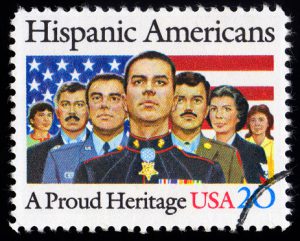 Sens. Lindsey Graham (R-S.C.) and Richard Durbin (D-Ill.) have introduced a new version of the DREAM Act, which they hope will protect more than a million young people from deportation if relief under Deferred Action for Childhood Arrivals (DACA) is ended.
Sens. Lindsey Graham (R-S.C.) and Richard Durbin (D-Ill.) have introduced a new version of the DREAM Act, which they hope will protect more than a million young people from deportation if relief under Deferred Action for Childhood Arrivals (DACA) is ended.


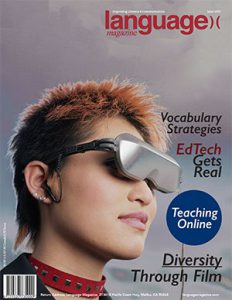 Inside June 2017 Issue:
Inside June 2017 Issue:
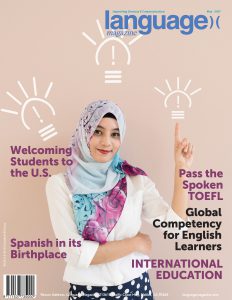
 Inside May 2017 Issue:
Inside May 2017 Issue: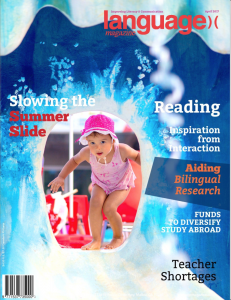 Inside the April 2017 Edition:
Inside the April 2017 Edition: